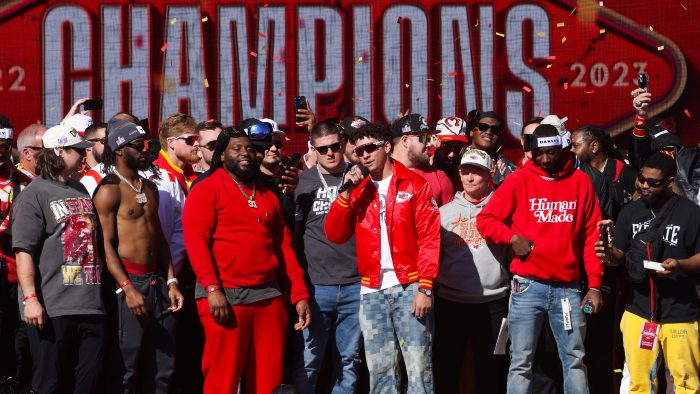Football has been America’s favorite and most popular sport for pretty much the entirety of the 21st century. The Super Bowl has been the most-watched annual tradition for most of my life — this year’s being the most-viewed telecast since the moon landing. The halftime show. The commercials. The pomp and circumstance. It’s all ingrained in the spirit of Americana. On Wednesday, the Kansas City Chiefs continued another tradition of celebrating their dynastic third Super Bowl in four years in the heart of their city.
During the parade, multiple gunmen opened fire on the crowd. Twenty-two people were shot. One person, Lisa Lopez, a DJ for the local KKFI radio station, was killed. About half of the people shot were children who were rushed to a nearby hospital. Another mass shooting. Another day of mourning.
There were more than twice as many mass shootings in 2023 (656) than NFL games in the 2023 season (272). By the time there’s another NFL championship parade, mass shootings will have killed a few hundred more people, and a couple of thousand more will be injured.
This, too, has become the most American of traditions.
Just as we have our Sundays down to a routine — maybe an early brunch, maybe church, maybe a game at the bar with friends, wearing our lucky jersey — America has mass shootings and the reactions to them down to a specific routine. We see the terror play out in real-time on social media. We pray the death toll isn’t too bad, an action that is a feeling of defeat because it means we’ve allowed ourselves to create our own individual metrics for what constitutes “one of the bad shootings.” We wait for politicians to offer thoughts and prayers. We find a semblance of hope in the stories of actual heroes: this time, the civilians who apparently tackled one of the alleged gunmen or the Chiefs players who consoled the children who were shaken and will never be the same. We wonder when they’ll have to be heroes again.
We frantically go through our phones for updates as phrases like “False Flag” start trending on social media — a term to indicate that the shooting didn’t happen and is part of a conspiracy. It’s the same type of conspiracy that led people to harass victims of the Parkland High School shooting — a shooting that happened exactly six years before the shooting at the Chiefs’ parade.
Then we wait.
We wait for the death toll to end. We wait for legislation that will never come. And we wait for the day a wayward bullet flies into the flesh of someone we love while we’re grocery shopping, at recess, enjoying a concert, or dancing at a parade for the sports team we’ve been rooting for our whole lives. We rage when nothing happens to change our reality. And we do it again. And again.
This is our American pastime.
I’d love to end this article here, turn it in to my editor and go about my Valentine’s Day plans. But I can’t. As I was writing this, a new alert popped up on my feed. About six miles from my house, someone opened fire in the parking lot of Benjamin Mays High School. Four people were shot. All of the victims were teenagers. It’ll be yet another mass shooting most of the country doesn’t know about — the 43rd school shooting in 2024, and we’re just two months in — hidden under the pile of new terrors we’ll wake up to tomorrow while we’re still trying to wrap our minds around what happened in Kansas City.
Things will change after the shooting during the parade, of course, just not the things that will make a massive difference about who lives or dies in America.
Championship parades, for instance, will never be the same. It may sound trivial, but it’s not. The parade, which used to be a moment for players to relish their victories with their fans, jumping in the crowds, sharing beers and shaking hands, will be no more. What will be in its place will be reminders of what we used to have before terror took over. There will be bulletproof glass and restricted interaction and metal detectors, and it will all feel post-apocalyptic in the way it feels dystopian to hear my son complain about code red drills interrupting him while he’s trying to read Captain Underpants in class.
It’ll all remind us that everything can be regulated, that even joy can be legally stripped away from us. And that anything we’ve ever known or loved can be shaved down to bare bones for the performance of safety when the thing that will save lives gets treated like an impossibility. We’ll be forced to remember that everything in this country can be sacrificed.
Except guns.
This, quite simply, is as American as a 1 p.m. kickoff on a brisk Sunday afternoon.
